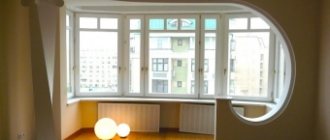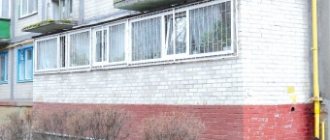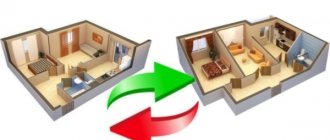What is best to decide on your own in approving the redevelopment of an apartment, and what to delegate
Living in captivity of conventions and stereotypes, a person often goes to extremes. This applies to any questions, incl. — reconstruction of the space of premises and facades. One part of the owners and tenants considers the approval of redevelopment “unaffordable” for independent implementation, while the other considers it to be the lot of professionals. Reality shows that the truth is in the middle. De facto, some issues related to changing the layout can be resolved by yourself. Entrust to specialized ones. We study and analyze procedural nuances in accordance with the content of the material.
Content
- In what cases does nothing need to be agreed upon?
- When can redevelopment be approved by notification?
- Procedure for full approval of apartment redevelopment
- Conclusion
The prevailing opinion that privatized housing can be remodeled at one’s own discretion, without permission, is a dangerous misconception, fraught with extremely unpleasant consequences.
In what cases does nothing need to be agreed upon?
In Irkutsk, approval of apartment redevelopment and reconstruction of non-residential areas is coordinated by the Irkutsk Housing Inspectorate. To facilitate the process of approving redevelopment in Irkutsk, a group of works has been formed that does not require a permit. It includes six types of work that do not change the configuration of the premises:
- Cosmetic repairs - replacement of plumbing fixtures, doors, surface finishes of walls, floors, ceilings with analogues with similar characteristics (parameters, properties);
- Dismantling old windows and installing new ones, if the configuration of the openings themselves does not change;
- Glazing of loggias and balconies protruding beyond the perimeter of the building;
- Dismantling built-in mezzanines;
- Installation of suspended and suspended ceilings;
- The installation of air conditioners (monoblocks) in windows, the installation of external units of split systems - in the architectural heritage only on the side facing the courtyard.
Repair, restoration and finishing work that is “cosmetic” in nature is not formally considered a change in the floor plan. For this reason alone, they do not need to coordinate the redevelopment and develop a redevelopment project.
Any work that affects the configuration of premises and leads to a change in footage is regulated by law. Therefore, it is necessary to coordinate the redevelopment of an apartment in Irkutsk. Certain types of the latter are subject to a simplified procedure. It is carried out in order to notify the controlling authority of the fact of the accomplishment. Detailed advice can be obtained on the official website of our company - pereplanirovka-irkutsk.ru.
Is it possible to demolish non-load-bearing walls without permission?
How to obtain permission to redevelop an apartment.
- disaggregation of multi-room apartments,
- transfer of electrical networks, gas and heating plumbing fixtures, etc.
- expansion of the apartment by adding auxiliary premises,
- partial demolition of supporting structures,
- combining a bathroom with a toilet,
- punching openings in load-bearing structures,
- moving doorways,
- combination of two or more apartments,
- changing the size of bathrooms, kitchens, rooms and corridors,
- installation instead of gas household electric stoves,
- moving a bathroom or kitchen,
- installation of additional ventilation ducts,
- installation of additional bathrooms or kitchens,
This type of redevelopment requires the development of an architectural project; without it, coordination of work is not possible.
Features of redevelopment of load-bearing walls in an apartment
Their size depends on the volume and type of work done; unauthorized redevelopment can be legalized only if it is done without violating the law.
Otherwise, the home owner will not only have to pay a fine, but also restore it to its previous form. Many people are concerned about the question: if non-load-bearing walls in an apartment are being redeveloped, is permission required? There is no clear answer to this question.
It all depends on the type of work. Article 26 of the Housing Code states that it is not necessary to obtain permission for the following types of repair work:
- if the balcony is glazed, but the appearance of the facade does not change; if doorways need to be made, moved, enlarged or reduced on non-load-bearing walls; during installation or complete demolition of partitions, if they are not load-bearing and this procedure does not overload the ceiling; to replace the shower cabin in the bathroom; for moving a gas or electric stove into the kitchen area.
For some types of redevelopment in the apartment there are certain restrictions.
What does not need to be agreed upon when remodeling an apartment?
The reconstruction includes procedures such as:
- Changes in housing parameters;
- Change of communication systems, including reinstallation of heating equipment;
- Any modifications noted in the technical and title documentation for the real estate.
Article 26 of the Housing Code of the Russian Federation establishes a list of works, the implementation of which is subject to obtaining permits from the relevant services:
- Transformation of the location of walls, windows and doorways, stairs between floors, cabinets built into structures, bathrooms and kitchen appliances, sewers and ventilation hatches;
- Changing the functionality of an object inside an apartment.
Is a permit required to demolish or move a non-load-bearing wall?
If the new wall does not affect the main floors, does not load them, and does not change the area of the apartment, its construction is not classified as redevelopment, but as repair or reconstruction work. No permitting documentation is required. And to legalize it, you don’t need to contact the housing inspectorate. It is enough to communicate with BTI specialists.
No approvals are required at all if your partition can be easily disassembled. Even when selling an apartment, if the structure is not needed by the new owner, it will simply be dismantled.
Is it possible to demolish a non-load-bearing wall without permission?
Until such a fact is discovered, nothing threatens the owner of the rebuilt apartment, that is, until he decides to sell, donate or exchange his living space.
This is where you will discover that until the changes are reflected in the technical passport, it is impossible to dispose of the unauthorized apartment.
Dismantling of concrete, brick, load-bearing walls. Price, prices for
For example, after dismantling the partitions between rooms, you can get more living space. And here we are talking not only about increasing the level of convenience - an apartment in which there is a lot of “useful” space will cost much more than usual when sold.
Not all types of repair work can be done without obtaining special permits.
Article 26 of the Housing Code states that it is not necessary to obtain permission for these types of repair work: In accordance with the current norms of the Housing Code of the Russian Federation, redevelopment of an apartment requires obtaining permission from the relevant authorities.
In addition, when starting a redevelopment, it is worth considering many factors that will tell you what and where can be remodeled: Many people are concerned about the question: if non-load-bearing walls in an apartment are being redeveloped, is permission required? However, some types of redevelopment actions do not require such permission. In this article we will answer the following questions: what types of redevelopment are usually distinguished?
Which of them should be approved by higher housing authorities, and which can be carried out without permission? Look for answers to these and other questions in this article.
In accordance with the Housing Code of the Russian Federation, the following types of changes in residential premises should be distinguished: Read in the next section about where exactly you can agree on the need to legalize changes made in residential premises.
The reconstruction of housing has been legalized; you can demolish storage rooms and make
When contacting the Moscow Housing Inspectorate, they answer that it is required to install double-glazed windows between the residential premises of the apartment and the loggias. Question: Is it necessary, in accordance with the new resolution, to approve glazing and the installation of television antennas on the facade of a residential building. Answer: Permission is not required for this work.
Question: Is it true that now no additional approvals are needed before submitting project documentation to the Moscow Housing Inspectorate? Is it true that Rosportebnadzor and the Ministry of Emergency Situations now approve the Moscow Housing Inspectorate itself even in non-residential premises? obtaining conclusions from Rospotrebnadzor and the Ministry of Emergency Situations is not required.
In case of controversial issues, the Moscow Housing Inspectorate itself sends requests to these authorities. Question: Can I make a redevelopment without obtaining permission, without affecting the load-bearing walls, and then approve it retroactively? Answer: The redevelopment can be carried out, and after the repair, call a commission to draw up an Act about the completed reconstruction.
In this case, the problem may be that the commission has the right to request a technical report on the condition of the load-bearing structures, completed by the author of the house project.
Be careful - in practice, often the work performed does not comply with SNi Pam and sanitary standards, which may be the reason for issuing an order from the Moscow Housing Inspectorate to restore the apartment to its original condition. Question: Why are kitchens with gas stoves separately identified in the new law?
When can you tear down walls?
- Demolition of walls in any apartment, regardless of the type of house, is a redevelopment that needs to be legalized.
- A wall can only be demolished if it is not load-bearing and does not lead to a wet area (in the latter case, difficulties will arise, since expanding such an area and moving it above/under neighbors is prohibited by law).
- If the wall is load-bearing, you can only insert a door (that closes tightly), but do not leave empty openings.
In many new buildings, instead of walls, there are wide columns to divide the space.
Some owners make niches in them or even try to demolish them; this is prohibited, since the main purpose of the columns is not a decorative element, but a design feature of the room that creates additional support.
What happens if there is no permission?
Theoretically, if no one knows about the redevelopment and you are not going to sell the apartment, nothing. But if vigilant neighbors tell you “where to go” and a commission comes to you, or difficulties arise when completing a purchase and sale transaction, the redevelopment may be considered illegal. What does this mean?
- the owner will have to restore the previous condition of the living space;
- imposition of a fine;
- deprivation of the right to use the premises (under a social tenancy agreement).
In any case, the redevelopment will need to be legalized in court.
If the owner refuses to approve the redevelopment and return the premises to its original condition, then:
- his home will be sold at auction, the funds will be returned to him minus the costs of executing the court decision;
- The social tenancy agreement with the tenant will be terminated, the owner will be obliged to return the premises to their original condition.
Institutions of appeal
In order to make sure what changes to the residential premises require permission, you should seek advice from one of the following authorized authorities:
- Housing Inspection;
- Municipal Department of Capital Construction.
Subsequently, if the need to obtain permission for the planned redevelopment is confirmed, you will have to contact the same listed authorities.
In addition to the listed authorities, the following can answer questions related to redevelopment:
- qualified legal specialists whose specialization is housing law;
- qualified employees of design firms involved in the development of project documentation.
What does not require permission and recording?
In accordance with the Housing Code of the Russian Federation, permission (from the relevant authorities) and recording (in the registration certificate) do not require the following changes inside the residential premises:
- Pasting/re-gluing wallpaper;
- Laying/re-laying linoleum, laminate, parquet;
- Other cosmetic repairs;
- Installation/replacement of doors, windows;
- Cladding of balconies/loggias;
- Installation of antennas;
- Installation of air conditioners;
- Replacement of plumbing;
- Replacing stoves in the kitchen;
- Replacement of geysers;
- Replacement/installation of water heaters.
When can redevelopment be approved by notification?
For those interested in the question of how to coordinate the redevelopment of an apartment on their own, we can inform you of the pleasantness. Among the changes in the layout of the internal space of premises and facades of buildings, there are “metamorphoses” that do not affect the load-bearing capacity of structures - supports, walls, ceilings. The implementation of these does not carry the risk of destruction and does not threaten the comfort, safety, health and life of people.
Independent approval of apartment redevelopment through a notification procedure is provided for:
- Dismantling of non-load-bearing partitions, piers, as well as their transfer (installation in another location);
- Dismantling of built-in niches and cabinets that do not form new rooms;
- Closing existing openings in walls and partitions;
- Making new openings in the walls, door openings in the partitions;
- Relocation of plumbing fixtures in existing bathrooms.
To redevelop residential and non-residential areas in the listed cases, permission is not required. The essence of the simplified algorithm for legitimizing alterations comes down to:
- Submission by the owner or his representative (tenant) of an application to make adjustments to the technical documentation;
- Registration within 10 days of an act on the completed reconstruction (redevelopment) of housing and non-residential areas;
- Reconciliation by the authorized representative (inspector) of the changes made with those submitted for registration.
What it is
Reconstruction – installation, relocation, as well as replacement of various equipment, the installation of which requires a special entry in the technical passport.
If the change does not require entry in the technical passport of the premises, then it will not be one.
These include:
- transfer of heating equipment;
- replacing a gas stove with an electric stove;
- installation of jacuzzi, large washing machines;
- refurbishment of toilets and bathrooms;
- laying a new or replacing an old water supply system, as well as electrical networks and other systems.
Redevelopment according to the Housing Code is recognized as such a configuration change in the premises, which requires a special entry in the technical passport.
Examples:
- change in living space of multi-room apartments;
- installation of stairs, openings;
- arrangement of terraces on the ground floor;
- installation and dismantling of partitions;
- increasing the space with the help of some auxiliary rooms.
Procedure for full approval of apartment redevelopment
When the implementation of the planned reconstruction involves violating the integrity of the load-bearing structural elements of the building's skeleton, a threat arises to the way of life, health and life of the inhabitants. In this case, the “rebuilders” will need not only knowledge of how to coordinate the redevelopment of an apartment, but also the development and approval of the project with the housing inspectorate, BTI, by contacting the multifunctional center.
Subject to approval:
- Combining bathrooms (bathtub, shower, toilet) or increasing their footage due to the corridor;
- Installation of a window in a non-load-bearing wall between the kitchen and the adjacent room;
- Increasing the size of the living room due to the corridor (part of it), adding a balcony or loggia;
- Making doorways in non-load-bearing partitions;
- Relocation of central heating radiators;
- Reconstruction of the floor, etc.
Illegal modification of the layout threatens sanctions ranging from a fine to a decision to return the alterations to their original state.
When is approval for the redevelopment of non-residential premises not necessary?
It will be possible to avoid paperwork and additional time and effort when performing repairs if the redevelopment does not involve:
- significant change in the weight of walls, floors and partitions;
- liquidation, change of location or installation of plumbing fixtures;
- adjustments to the building's exterior;
- dismantling old or installing new interior structures.
The Administrative Code of Russia prescribes punishment for illegal planning, so even if for some reason the repair work was carried out without permitting papers, the redevelopment still needs to be approved. The lack of official approval will not allow any real estate transactions to be legally carried out in the future. First you will have to legitimize everything, and only then sell it, donate it, exchange it, or register it as an inheritance.
Share link:
You may like:
- Apartment redevelopment: list of documents, approval features
- Do I need to obtain permission to remodel a bathroom?
- Balcony redevelopment: approval, legalization, photo
- Replacing a bath with a shower: is it a remodel or not?
- Redevelopment of a three-room apartment: renovation ideas in Khrushchev with before and after photos
- Apartment redevelopment: combining kitchen and room with photo
- How much can it cost to renovate a three-room apartment in a new turnkey building?
- Review of the resolution on restricting the provision of utility services
- Where and how to legalize unauthorized redevelopment in an apartment in 2019








